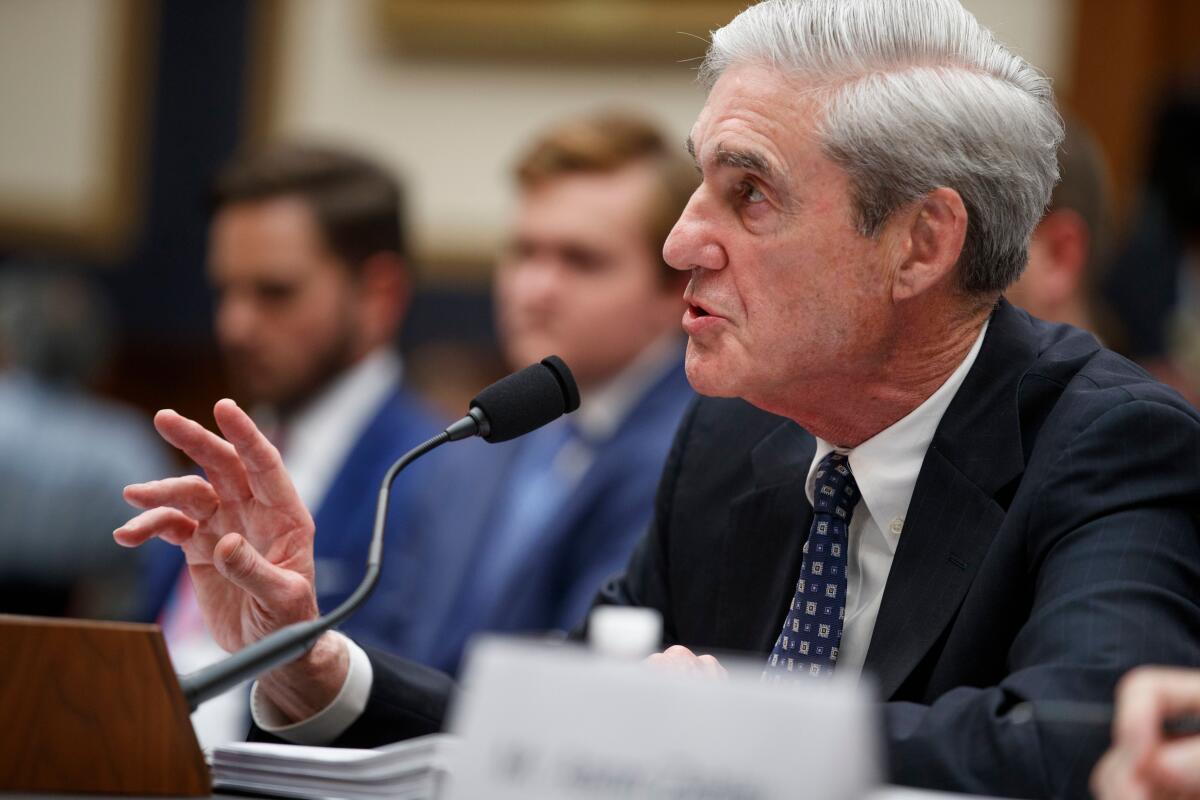Newsletter: Impeachment a tough call? Only in Trump’s America

- Share via
Good morning. I’m Paul Thornton, and it is Saturday, July 27, 2019. Let’s take a look back at the week in Opinion.
At almost any other time in American history, a decorated Marine with a highly distinguished legal and law enforcement career vouching for his 400-page report detailing a president’s impeachment-worthy conduct would be greeted with (at least) deference or (at best) bipartisan gratitude.
But Robert S. Mueller III had the misfortune of explaining his life’s most important investigation to a bunch of Republicans eager to engage in character assassination on behalf of the the most amoral president in U.S. history, and in front of a media that valued “optics” just as much as the details of Mueller’s report.
It is in this context that the L.A. Times Editorial Board concluded that members of Congress were in a tough spot after Mueller’s testimony on the question of whether to pursue impeachment. The board noted that “impeachment raises its own problems,” and that no matter what Democrats do after Mueller’s testimony, “we hope that voters were watching Wednesday, that they are now well-informed about the last election campaign and the events that followed, and that, come what may, they will remember those facts on election day 2020.”
Besides impeachment, here’s what Congress can do now: Pass legislation bolstering election security, restoring the rule of law and preventing presidents from similarly abusing their power, write Corey Dukes and Justin Vail. L.A. Times
Adam Schiff is really good at his job. Until the House Intelligence Committee chairman spoke, Democrats were busy “mansplaining” the Mueller report to Mueller, Republicans were badgering Mueller, and the hearing was going nowhere. Then it was Schiff’s turn to speak, and he “drew out the profound moral implications of the Mueller report,” writes Virginia Heffernan. L.A. Times
“Never again” is right now. David Ulin begins his piece, “We live in a country where people are being held in concentration camps,” and gets only more provocative thereafter. He concludes: “Eighty years ago, in Germany, I would not have been allowed to write this in a newspaper. Seventy-five years ago, I would not have been allowed to live. I write it today, not because the situations are perfectly analogous, but because we must do everything in our power to ensure they never are.” L.A. Times
Trump’s environmental regulators could learn something from automakers. He might have thought his attempt to quash the Obama-era fuel economy standards would be welcomed as a gift by the industry, but it turns out automakers were on the side of the planet (and California, which is by far the nation’s largest car market and sets its own emission standards). If sustainability is good business, why not cheer when car companies watch our for their bottom line? New York Times
There’s a difference between explaining Trump and justifying what he says. Jonah Goldberg makes this distinction in his column about the president’s tweets, but it isn’t clear which of the two he’s trying to do. Goldberg says the president could have indeed tweeted what he did to four congresswomen of color out of racial animus, which would make him a racist. But, Goldberg writes, we also know the president is remarkably ignorant and simply might not have known that all four of his targets were U.S. citizens, and only one was born overseas -- which, perhaps, is supposed to reassure us. L.A. Times
Reach me: paul.thornton@latimes.com
More to Read
A cure for the common opinion
Get thought-provoking perspectives with our weekly newsletter.
You may occasionally receive promotional content from the Los Angeles Times.






